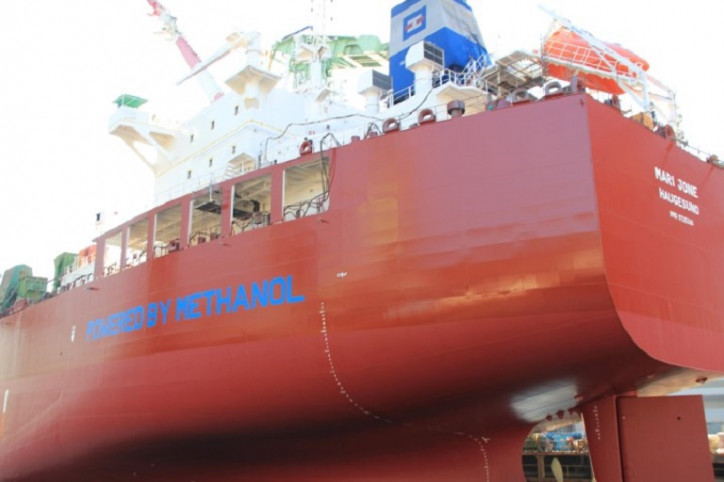Twin tankers pass 10,000 operating hours on clean methanol; ME-LGI fleet records 50,000 cumulative hours
Marinvest, the Swedish ship-management company, has announced that its Mari Jone and Mari Boyle, two of the first vessels powered by dual-fuel ME-LGI (-Liquid Gas Injection Methanol) engines operating on methanol, have each passed 10,000 operating hours on the alternative fuel. Additionally, the company reports that its combined ME-LGI-powered fleet has passed a cumulative total of 50,000 operating hours on methanol.

The two methanol tankers are managed on timecharters for Waterfront Shipping and operate globally, providing an uninterrupted flow of methanol between storage terminals and customer plants.
Bjarne Foldager – Senior Vice President, Head of Two-Stroke Business at MAN Energy Solutions – said: “The successful passing of this significant milestone is testament to the ME-LGI’s strong concept, and indeed the strength of our dual-fuel portfolio as a whole. With well over 250 sales within MAN Energy Solutions’ entire portfolio of low-speed, dual-fuel engines – all running on clean fuels such as methanol, LPG or LNG – this new achievement stands testament to our leadership within a critical market segment.”
René Sejer Laursen – Sales & Promotion Manager, MAN Energy Solutions – said: “When introducing methanol as a two-stroke marine fuel, we encountered the usual teething problems, including addressing the liner lubrication because of methanol’s potentially corrosive behaviour. However, the service experience gathered after 50,000 hours of cumulative operation has ironed all such problems out and the ME-LGI engines are now running smoothly with no maintenance issues. In fact, they are even showing an improvement in fuel efficiency.”
About the MAN B&W ME-LGIM engine
MAN Energy Solutions developed the ME-LGIM dual-fuel engine for operation on methanol, heavy fuel oil (HFO), marine diesel oil (MDO), or marine gas oil (MGO). The engine is based on the company’s proven ME-series, with its approximately 5,000 engines in service, and works according to the Diesel principle as methanol is a low-flashpoint, liquid fuel. When operating on methanol, the ME-LGI uses HFO, MDO, or MGO as a pilot fuel, significantly reduces emissions of CO2, NOx and SOx, and eliminates methanol slip. Additionally, any operational switch between methanol and other fuels is seamless. Tests on the engine, when running on methanol, have recorded the same or a slightly better efficiency compared to conventional HFO-burning engines.
MAN developed the ME-LGI engine in response to interest from the shipping world in operating on alternatives to heavy fuel oil. Methanol carriers have already operated at sea for many years. With a viable, convenient and economic fuel already on-board, exploiting a fraction of the cargo to power a vessel makes sense with another important factor being the benefit to the environment.
Background
In 2013, Marinvest negotiated on behalf of Skagerack Invest and Waterfront Shipping – the global marine-transportation company and a wholly-owned subsidiary of Methanex Corporation – for two 50,000 dwt oil/chemical carriers with dual-fuel methanol engines. The Mari Jone and Mari Boyle were subsequently delivered in 2016.
The two medium-range, methanol-burning, dual-fuel vessels are among the world’s first ocean-going vessels capable of running on methanol. With the growing demand for cleaner marine fuel to meet environmental regulations, methanol is an alternative marine fuel that can meet the industry’s increasingly stringent emissions regulations. Methanol is a cost-competitive biodegradable, clean-burning marine fuel that significantly reduces smog-causing emissions such as particulates, sulphur oxides and nitrogen oxides, and also reduces greenhouse-gas emissions. It is one of the world’s largest traded chemicals and available globally.
About Marinvest
Marinvest is a private shipping and investment group, part owners and managers of product and chemical tankers. Holdings include investments in tankers of about 80,000 dwt, chemical tankers between 20,000 to 50,000 dwt, a developing coastal shipping company and real estate.
Source: MAN